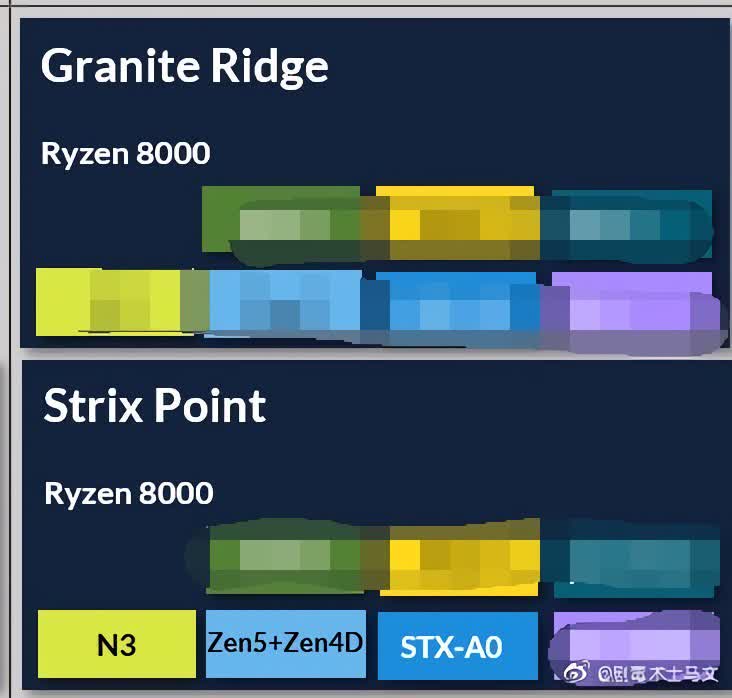AMD's 3nm-based Zen 5 processors appear in leaked roadmap
Rumor mill: We've heard enough of rumors about Zen 4, but what nigh its successor? Despite beingness a couple of years away, at least, a leaked partial roadmap has revealed some possible details near AMD's futurity CPUs, including their Ryzen 8000 branding and utilize of the 3nm manufacturing process.
The leak, which comes from Chinese microblogging site Weibo, claims that the follow-upwardly to AMD'southward Zen 4-based Ryzen 7000 (Raphael) mainstream desktop CPUs will be the Ryzen 8000 series, codenamed Granite Ridge. The same generation notebook APUs, codenamed Strix Point, will also use the Ryzen 8000 proper name.

Information technology's believed that Zen 5 will be based on the 3nm manufacturing procedure, presumably from TSMC (N3). As with Zen iv, Zen v is said to use the AM5 socket. The change means concerns over angle one of the CPU'southward pins may be a affair of the past as AMD is reportedly switching from a pin grid array (PGA) blueprint to the same country grid assortment (LGA) design favored by Intel for the bulk of its fries.
The Strix Point CPUs are likewise said to be taking a foliage from Intel'due south book. Much similar Chipzilla'south upcoming Alder Lake processors, AMD'southward APUs are said to use a hybrid big.LITTLE architecture that mixes Zen 4 and Zen 5 cores.
Unlike the 3nm-based Zen5, Zen four is expected to use the 5nm process, only that could change in Strix Betoken. The picayune cores in the APUs accept the codename Zen4D and could be an enhanced version of the compages, ane based on the 3nm procedure. The chips are also rumored to use a new L4 cache system that will work as system-level cache.
It's unclear whether AMD will prefer a hybrid design for its Granite Ridge desktop CPUs as well, though it seems unlikely. Zen 4 isn't expected to go far until next yr, while Zen v is slated for 2023, so it'll be a while before nosotros know for certain.
Hopefully, the fleck shortage the world is currently enduring volition be long-forgotten by the time Zen five rolls around. AMD recently admitted that the current situation had forced it to prioritize the manufacture of its high-stop processors over budget offerings.
Source: https://www.techspot.com/news/89855-amd-3nm-based-zen-5-processors-appear-leaked.html
Posted by: rileylecrid.blogspot.com


0 Response to "AMD's 3nm-based Zen 5 processors appear in leaked roadmap"
Post a Comment